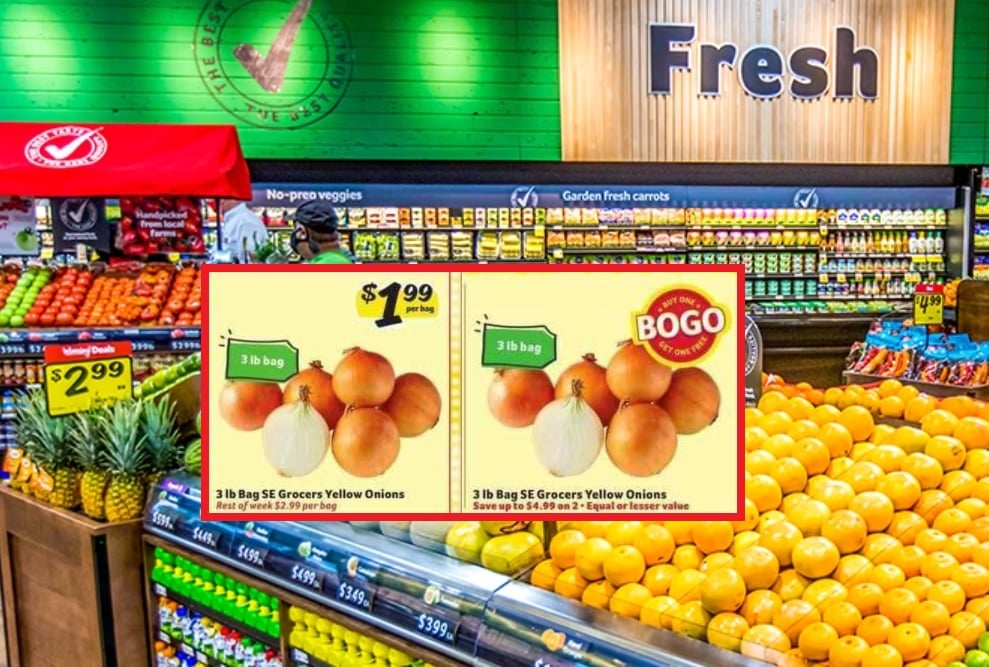ALDI announced late last week that it has formally completed its purchase of Winn-Dixie owner Southeastern Grocers, bringing some 400 stores into its portfolio. But along with the stores, their inventory and employees, comes some baggage – including a proposed class-action lawsuit accusing ALDI’s new acquisition of running “an unfair and deceptive BOGO scheme.”
Winn-Dixie has asked a judge to throw out the lawsuit, claiming the plaintiffs have no basis for complaint. But three Florida shoppers disagree.
Eric Bechtel, Kevin Everson and Robbie Sayde filed suit last December, accusing the grocery chain of deceptively raising the “regular” price of items offered in buy-one-get-one-free sales, forcing shoppers to pay more for a single item than they would have if the item wasn’t part of a BOGO sale at all.
“Winn-Dixie routinely inflates the regular price of its products just prior to placing them on BOGO,” the lawsuit alleges. As a result, shoppers who expect to buy one item at regular price and get a second one for free, instead “pay more for the first product and buy more of the product than they otherwise would to obtain the illusory ‘free’ product.”
The lawsuit cites guidelines from the Federal Trade Commission. In a BOGO sale, those guidelines explain, a shopper can expect that “the word ‘Free’ indicates that he is paying nothing for that article and no more than the regular price for the other.” A shopper “has a right to believe” that a store will not try to make up for the cost of the free item by “marking up the price of the article which must be purchased.”
That’s not how it works at Winn-Dixie, though, the lawsuit states. As pictured above, in one recent sales circular, a 3-pound bag of yellow onions was listed as having a regular price of $2.99, on sale that week for $1.99. “But when that same bag of onions is placed on a BOGO sale the price jumps to $4.99,” the shoppers argue. Instead of purchasing a bag for $2.99 and getting a second bag free, many shoppers will “end up paying $4.99 believing the second bag is ‘free’ when it is not.”
The lawsuit features a list of 11 items with their “regular” price and “BOGO” price. Some items are a dollar or two more expensive when they’re part of a BOGO sale. Others have even greater price discrepancies – the suit cites a package of chicken wings with a regular price of $11.99 that jumps to $19.99 when Winn-Dixie advertises it as buy-one-get-one-free.
The solution is simple, the shoppers claim. “When Winn-Dixie offers an item under its BOGO program, the consumer should receive the second item free and pay regular price for the first item.” Instead, they claim they were “deceived by Winn-Dixie’s BOGO program, as they were unaware that the regular price of the BOGO products had been inflated such that the second product was not actually free.”
In Winn-Dixie’s response filed late last month, it does not deny changing prices during BOGO sales. But it insists shoppers are still getting a deal. In the chicken wings example, a shopper who buys two packs at the regular price of $11.99 each, would pay a total of $23.98. At the BOGO price of $19.99, they get two for $19.99, which still represents a savings off “regular price.”
“The BOGO promotions at issue are straightforward,” Winn-Dixie states. “If a customer buys one of the items for the price stated, then Winn-Dixie will give them a second one for free. That is the offer, and it is objectively true.” The plaintiffs “do not allege that they paid more than the BOGO price stated, they do not allege that the merchandise was defective, that it was worth less than what they paid, or that they could have shopped around and found a better price in the marketplace but for Winn-Dixie’s deception.”
Furthermore, the retailer argues, the FTC guidelines are just that – guidelines. “They do not have the force of law.” So the plaintiffs’ argument, Winn-Dixie concludes dismissively, “is not an original idea. Plaintiffs have filed these ‘But-I-Thought-I-Was-Getting-A-Bargain’ claims throughout the country. But they have been unsuccessful.”
That’s not entirely true, since a similar complaint in Oregon against Safeway several years ago resulted in a settlement, in which the grocery chain agreed to give $200 refunds to customers, without admitting wrongdoing.
Winn-Dixie, however, is showing no sign of wanting to settle. It’s asked the judge in the case to dismiss the lawsuit. The plaintiffs, meanwhile, are seeking compensation for themselves and all other affected shoppers, in an amount to be determined at trial.
Weekly sales at Winn-Dixie’s new owner ALDI are much more modest, as ALDI has just a slim sales circular and nowhere near the “thousands of BOGOs” that Winn-Dixie advertises. ALDI has already said that some 50 of Southeastern Grocers’ stores will be converted to ALDI stores by next year, with potentially more conversions to come. So if those stores end up having no BOGO sales at all – perhaps it’s just as well.
Image sources: Eric Bechtel, Kevin Everson, Robbie Sayde / Winn-Dixie















Winn Dixie has been been doing this for year. I stopped shopping there BOGO because of there fraudulent BOGO sales,( 1 exception ). 2weeks ago I shopped there liquor BOGO. A bottle of bourbon was priced at $33.00 BOGO. Inougntthe bull sh*t ! I mean we’re can you buy good bourbon for $16.50 a bottle, (no where ) . When I got home, knowing how Winn Dixie works there bogo I googled this bottle of bourbon. $16.00 a bottle every where. Boycott Winn Dixie until somebody brings them down.
I have proof of this as well raising prices when you get to the counter to check out
Every grocery store in my area has used this BS tactic forever. Giant Eagle practices this scheme weekly. Walmart uses a slightly different scheme. Any active rebates via apps and paper coupons are used to increase the prices of items. So that coupon/rebate offer is wasted unless Walmart has an agreement with rebate apps to lock a price in. This info is strictly based on my own research and tracking I personally have done for over 6 years. It never fails to amaze me at how dishonest companies are. Currently you can go to any DG Walmart,CVS and pick up the new Dove deodorant. Prices range for $11.98 and up. Why? Because there is a $5.00 rebate, a $4.00 coupon and various offers out there. Once those coupons expire stores will either stall the price put it on clearance with its original price minus a few cents, and try to scam buyers claiming it’s a discount until it get pulled off the shelves. By the way Walmart clearance items usually aren’t on clearance at all.